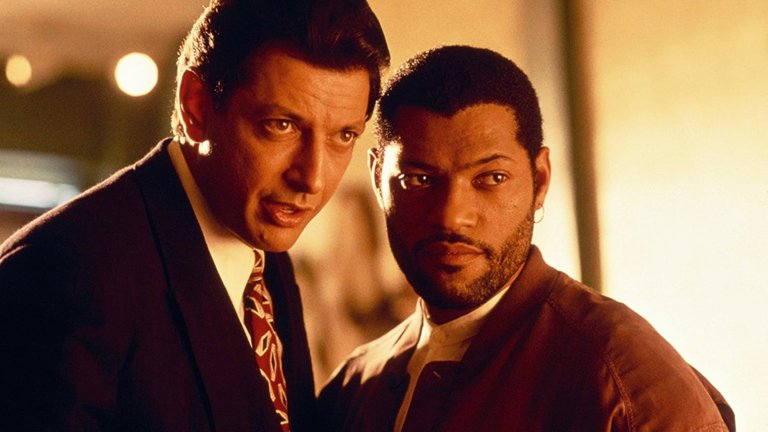Film Review: Deep Cover (1992)

Decades-long failure of US government to win War on Drugs led many to believe that the ultimate victory wasn’t the actual aim of the campaign. Lucrative prison-industrial complex, introduction of Orwellian surveillance state and bloating federal bureaucracy with officials that run the country as their personal fiefdom were much more visible results. Some of those issues are covered in Deep Cover, 1992 thriller directed by Bill Duke.
Protagonist, played by Laurence Fishburne, is Russell Stevens, uniformed policeman from Cincinnati who is selected by top DEA agent Gerry Carver (played by Charles Martin Smith) to take part in complex and dangerous long-term undercover operation. Stevens is to take new identity as small-time drug dealer “John Hull”, go to Los Angeles and try to infiltrate huge drug smuggling organisation led by Anton Gallegos (played by Arthur Mendoza), which controls 40 percent of all drug trade on West Coast. Carver selected Stevens because of his rebellious anti-authoritarian nature and other flaws that would become virtues if he works undercover as an alleged criminal. Stevens gradually works on the street until he gets arrested by LAPD detective Taft (played by Clarence Williams III), but gets released thanks to gang’s lawyer David Jason (played by Jeff Goldblum). Two of them become friends and partners and Stevens continues to rise towards the upper echelons of Gallegos’ organisation. However, Gallegos’ underboss Felix Barbossa (played by Gregory Sierra) appears not to like it, while Jason starts planning production of synthetic cocaine. In the meantime, Stevens begins romantic relationship with Betty McCutcheon (played by Victoria Dillard), art dealer that helps Jason launder money.
Deep Cover was made at the time when War on Drugs was supposed to replace Cold War as the main concern for Americans. Script by Michael Tolkin and Henry Bean takes very critical, but nuanced approach to the issues. Effects of illegal drugs are clearly addressed, partly through unfortunate addict characters (most of them black) Stevens finds on the street, partly through a moralising but effective speech of otherwise cynical Carver. Yet, the protagonist increasingly starts to question whether his mission makes any sense. In order to maintain his cover, he has not only to sell drugs to children and pregnant women, but also take another man’s life in cold blood. He begins asking whether he is any different from the ruthless murdering dealers he is supposed to take down, and his concerns are justified at the end, when it is revealed that his government bosses take similarly Machiavellian approach and allow biggest of drug dealers to evade punishment due to arcane political considerations.
Bill Duke, character actor who also had a distinguished career as television director, handles the material very well. He skilfully applies different styles to typically 1980s police thriller – 1970s blaxploitation films (like in the prologue in which 10-year old Stevens sees his junkie father killed during liquor store robbery) or film noir. The latter is seen through most of the scenes taking part at night and with protagonist’s cynical narration, although it is slightly compromised with the use of rhymes that at times makes it too pretentious or “artsy”. Laurence Fishburne, for whom Deep Cover was the first starring role, does an excellent job as troubled and complex character with whom the audience can sympathise. But he is somewhat overshadowed by Jeff Goldblum in the role of a well-to-do lawyer and family man who actually gets seduced by the excitement and lack of rules in drug smuggling world. Goldblum makes the character of Jason fascinating, despite his style of acting being restrained in comparison with his better known roles. Charles Martin Smith is also great as arrogant and powerful Princeton-educated bureaucrat who doesn’t miss any opportunity to show his hierarchical and social superiority over the lower-class protagonist. The ending, during which protagonist manages to score something of a victory, is slightly too neat and too Hollywood for this bleak and thought-provoking film. But Deep Cover nevertheless functions as well-directed and well-acted thriller that still manages to ask some uncomfortable questions about difficult issues.
RATING: 7/10 (+++)
Blog in Croatian https://draxblog.com
Blog in English https://draxreview.wordpress.com/
Leofinance blog https://leofinance.io/@drax.leo
Cent profile https://beta.cent.co/@drax
Minds profile https://www.minds.com/drax_rp_nc
Uptrennd profile https://www.uptrennd.com/user/MTYzNA
Unstoppable Domains: https://unstoppabledomains.com/?ref=3fc23fc42c1b417
Hiveonboard: https://hiveonboard.com?ref=drax
Bitcoin Lightning HIVE donations: https://v4v.app/v1/lnurlp/qrcode/drax
Rising Star game: https://www.risingstargame.com?referrer=drax
1Inch: https://1inch.exchange/#/r/0x83823d8CCB74F828148258BB4457642124b1328e
BTC donations: 1EWxiMiP6iiG9rger3NuUSd6HByaxQWafG
ETH donations: 0xB305F144323b99e6f8b1d66f5D7DE78B498C32A7

https://twitter.com/21393347/status/1592414711441948672
The rewards earned on this comment will go directly to the people( @drax ) sharing the post on Twitter as long as they are registered with @poshtoken. Sign up at https://hiveposh.com.
American crime films are very revealing for viewers from other countries, beyond seeing a fictional story, they tell us about a very strong reality that is lived in this country, however, it does not take away the good things about this genre.
3 decades and still this same shit going on in huge swathes of the country. They told us weed would kill us back in fucking 2010, as if our ancestors hadn't been smoking that shit for the last 4000 or so years.
Posted using CineTV